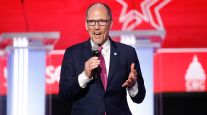Senior Reporter
Congressional Infrastructure Window 4-6 Months, Stakeholders Say
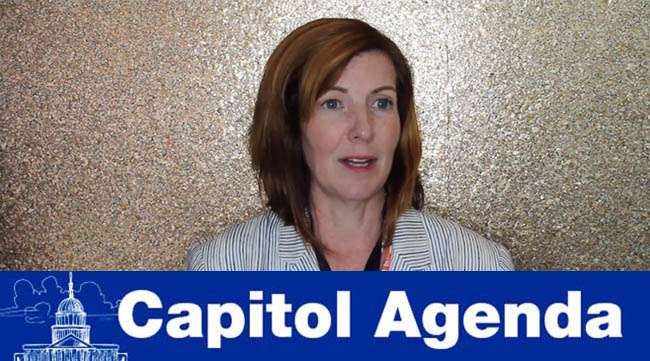
Memo to the transportation policymakers on Capitol Hill: If you are sincere about advancing a comprehensive infrastructure measure this year, you gotta do it soon.
That’s the message from a great number of stakeholders.
Since the start of 2019, freight executives, state lawmakers, academics, experts and users have headlined panels and testified before Congress to lecture lawmakers about the urgency of the matter.
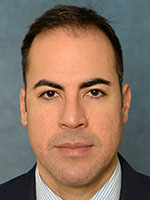
Mulero
Their point is simple. Bottlenecks are hindering the economy. Subways are not running on time. Like many states, Uncle Sam should approve new revenue to help officials improve freight and commuter networks.
“We can’t continue going on like we are as a nation,” Ferndale, Mich., Councilwoman Melanie Piana told Transport Topics at the U.S. Chamber of Commerce this month. “You still need a strong, reliable government partner in order to — a strategic partner — to really make sure that the investment is brought to the table.”
“It is a critical time for making needed federal investments in the nation’s port-related infrastructure,” the American Association of Port Authorities emphasized in remarks to the House panel on multimodal transportation. “Nowhere is there such a stark example of our country’s infrastructure needs and the failure to keep pace with our growing economy than with freight- and port-related infrastructure investments.”
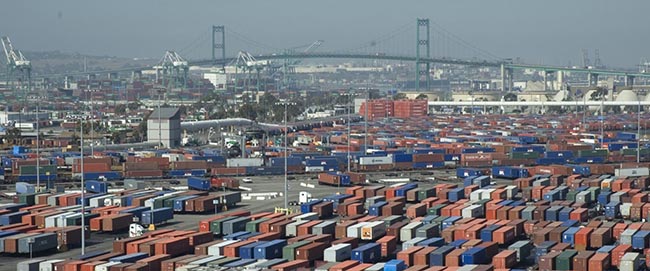
Port of Long Beach, Calif., by Charles Csavossy/Wikipedia
The industry consensus is that the authorizing committees need to have legislation ready for President Donald Trump’s signature ideally before the congressional August recess.
The longer lawmakers spend debating provisions, especially a long-term fix for the Highway Trust Fund, the harder it will be to reach a deal on a bill.
A look at the congressional calendar helps to explain why. By autumn, the appropriations process will dominate the House and Senate. Congress’ workflow typically slows down after the Thanksgiving holiday. In 2020, presidential politics will eclipse policy work in Washington.
Again, the memo.
“We’ve struggled to maintain our current network in a state of good repair, right? Let alone enhance the network or build the network out … that needs to be a focus in the future,” Thomas Jensen, senior vice president of transportation policy at UPS Inc., told an audience at the Information Technology and Innovation Foundation this month. “The money issue is tough. People don’t want to spend — people meaning most people we elect — don’t want to spend money on this.”
Jensen added, “Is it going to happen this year? Well, we probably got a six-month window, and that window is now probably down to four months. And that window is rapidly closing. And if it doesn’t happen then, it probably won’t happen ’til after the 2020 presidential election. That’s the sad state of where we are.”
The Week Ahead (All times Eastern)
Feb. 22-25: The National Governors Association hosts its Winter Meeting.
Feb. 25, 12 p.m.: The U.S. Chamber of Commerce hosts its fourth annual “Invest in America!” Council of Economic Advisers Chairman Kevin Hassett is scheduled to deliver keynote remarks. Sens. Mark Warner (D-Va.) and John Hoeven (R-N.D.) are among the officials scheduled to speak at the event.
Feb. 25, 2 p.m.: The Environmental and Energy Study Institute hosts a briefing titled, “How Climate Change Affects the United States: Exploring the NCA (National Climate Assessment) and IPCC (Intergovernmental Panel on Climate Change) Reports.” Participants include Senate Environment and Public Works ranking member Thomas Carper (D-Del.).
Feb. 26, 10 a.m.: The House Transportation and Infrastructure Committee hosts a hearing on climate change. Witnesses include Daniel Sperling with the California Air Resources Board, Vicki Arroyo with the Georgetown Climate Center, Thomas P. Lyon of the Stephen M. Ross School of Business at the University of Michigan, Kevin DeGood with the Center for American Progress and Lynn Scarlett with The Nature Conservancy.

Spotlight Hearing
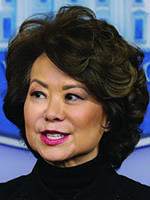
Chao
Feb. 26-March 1: Bring popcorn because it’s going to get good at the annual Washington briefing that our friends at AASHTO (American Association of State Highway and Transportation Officials) put on. The current Mount Rushmore of Congress’ surface transportation authorizers are scheduled to speak Feb. 27, prior to remarks by Transportation Secretary Elaine Chao. House Transportation Chairman Peter DeFazio (D-Ore.), committee ranking Republican Rep. Sam Graves of Missouri, Senate Environment and Public Works Chairman John Barrasso (R-Wyo.) and ranking Democrat Sen. Tom Carper of Delaware need to give state executives a clear sense of where they are on an infrastructure bill. Oh, and how to fund infrastructure projects in the coming years. Come early for the members of Congress. Stay for the secretary’s remarks.
Feb. 26, 10 a.m.: The House Commerce, Justice, Science, and Related Agencies Appropriations Subcommittee meets for a hearing titled, “Understanding the Changing Climate System and the Role of Climate Research.” Witnesses include Assistant Commerce Secretary for Environmental Observation and Prediction Neil Jacobs, and NASA Earth Science Division Director Michael Freilich.
Feb. 26, 10 a.m.: The Cybersecurity, Infrastructure Protection and Innovation and Transportation and Maritime Security subcommittees hosts a joint hearing titled “Securing U.S. Surface Transportation from Cyber Attacks.”
Feb. 26, 2 p.m.: The American Society of Civil Engineers hosts a webinar on ways to participate during Infrastructure Week.
Feb. 26, 2:30 p.m.: The Senate Transportation and Safety Subcommittee hosts a hearing on intermodal connectivity. Witnesses include Chuck Baker, president of the American Short Line and Regional Railroad Association; Noel Hacegaba, deputy executive director for administration and operations for the Port of Long Beach, representing the Intermodal Association of North America; Donna Lemm, executive vice president of IMC Cos., representing the Agriculture Transportation Coalition; and Joseph C. Szabo, executive director of the Chicago Metropolitan Agency for Planning, representing the Coalition for America’s Gateways and Trade Corridors.
Feb. 27-March 2: The American Conservative Union hosts the Conservative Political Action Conference.
Feb. 27, 10 a.m.: The House Environment Subcommittee hosts a hearing on climate change.
Feb. 27, 10 a.m.: The House Budget Committee meets to review the 2017 tax law. Witnesses include Caroline Bruckner, executive in residence in American University’s Department of Accounting and Taxation; William G. Gale, chair in federal economic policy at the Brookings Institution and co-director of Tax Policy Center; and Chye-Ching Huang, director of federal fiscal policy at the Center on Budget and Policy Priorities.
Feb. 27, 10:30 a.m.: The House Energy Subcommittee hosts a hearing titled, “Blue Collar to Green Collar Jobs Development Act of 2019.”
Feb. 27, 3:30 p.m.: The National Academy of Sciences hosts a webinar titled, “Improving the EPA Multi-Sector General Permit for Industrial Stormwater Discharges.”
Feb. 27, 6:30 p.m.: The New York Times hosts a discussion on infrastructure policy with former Transportation Secretary Anthony Foxx.
Feb. 28, 7 p.m.: Politics and Prose Bookstore hosts a discussion titled, “Putin’s World: Russia Against the West and with the Rest.” Participants include Angela Stent, director of Georgetown University’s Center for Eurasian, Russian and East European Studies.
Mood Swings
House transportation authorizers are taking baby steps in exploring the themes for their infrastructure legislation. And top White House and administration officials have signaled a strong desire to advance a bill. Industry stakeholders say they are noticing the effort.
In Case You Missed It
Being stuck in traffic hurts your wallet.
Who’s New
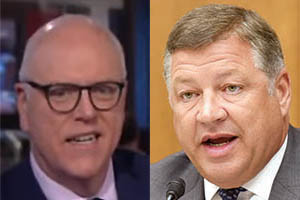
Crowley Shuster
In this latest installment of Washington’s “Revolving Door,” Rep. Bill Shuster (R-Pa.), the former chairman of the transportation panel in the U.S. House of Representatives, and former New York Rep. Joe Crowley (ousted by AOC), have taken their talents to K Street. Shuster and the Democratic Crowley have secured high-profile gigs at Squire Patton Boggs. As the firm put it: “The skills and experience Bill and Joe bring will be an asset for clients all over the world who are seeking to navigate the challenges of modern-day Washington. They are a blockbuster addition to our global, bipartisan public policy practice.”
 Buzz
Buzz

If you are among the stakeholders scratching your head about the latest funding appropriation for the Federal Motor Carrier Safety Administration, remember that last year’s funding law repurposed old Motor Carrier Safety Grant funding for autonomous vehicle research, and construction of transportation infrastructure at border facilities.
Favorite Video
It’s crumbling. Literally.
Favorite Tweet
The past is prologue.
#TBT to the July, 1982 edition of Civil #Engineering Magazine. 37 years later & we still have the same priority — invest in America’s D+ #infrastructure pic.twitter.com/96rCSEDP1J — ASCE Gov't Relations (@ASCEGovRel) February 21, 2019
The Last Word
The thing we love more than cars, is we love free parking.
Gov. Doug Burgum (R-N.D.) on Feb. 24 during the National Governors Association Winter Meeting in Washington
We publish weekly when Congress is in session. E-mail emulero@ttnews.com with tips. Follow us @eugenemulero and @transporttopics.



